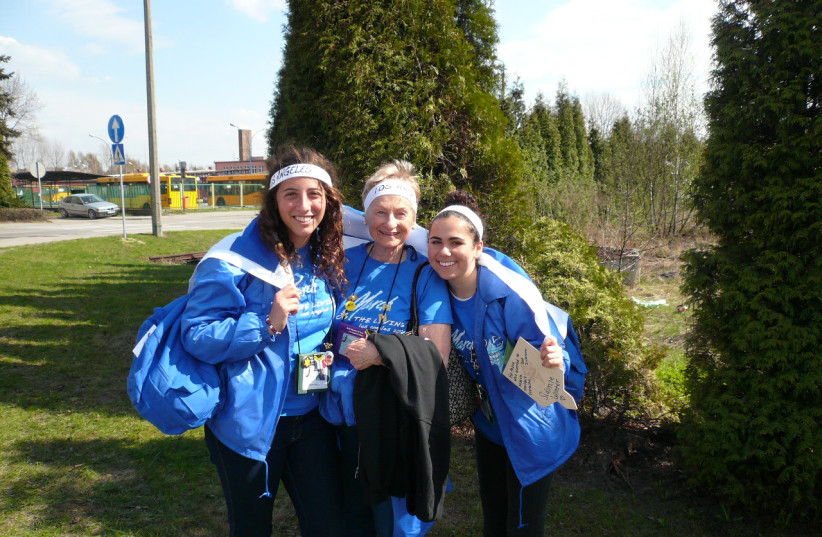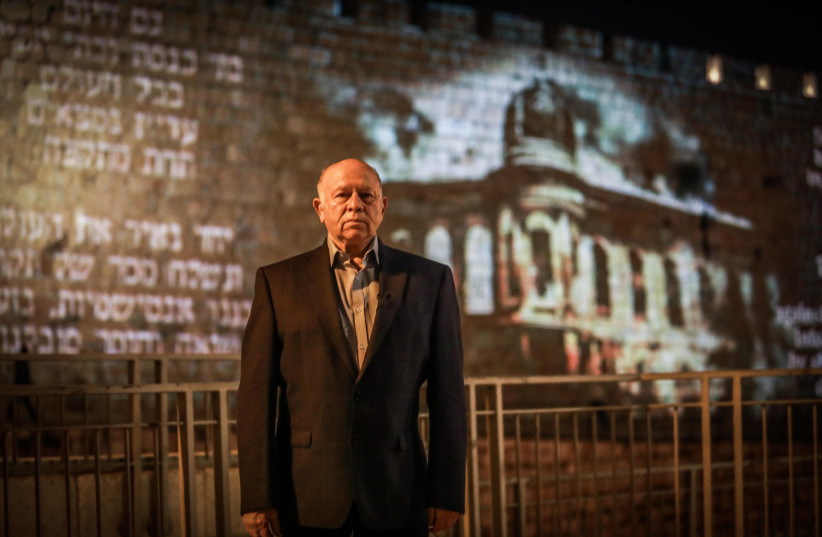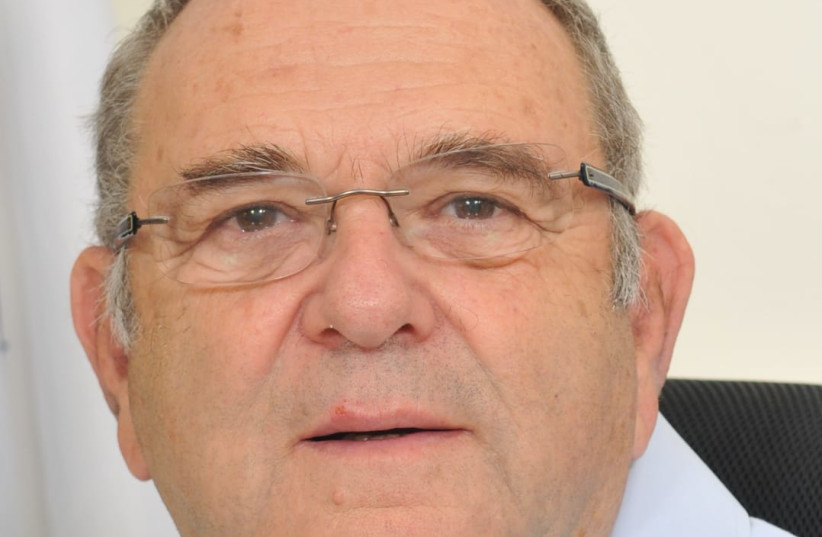After a two-year hiatus in which the March of the Living did not take place due to the pandemic, more than 2,500 participants – Jews and non-Jews alike – will march this week on Holocaust Remembrance Day in the traditional March of the Living in Poland.
Eight Holocaust survivors who have participated in the event many times will lead the march, and alongside them will be a delegation of Ukrainian refugees and delegations of the March of the Living’s strategic partners, including KKL-JNF; the Jewish Agency, Eitan Neishlos, founder of the Neishlos Foundation and a grandchild of a Holocaust survivor; Jerusalem Mayor Moshe Lion, who will lead a municipal delegation; and Israel Aircraft Industries management. The march will be at a reduced capacity because of the war in Ukraine and the pandemic.
“We thought that these things no longer occurred. We thought people had learned from history and that people would stand on their own two feet and do something, but in the meantime, people are being murdered, and the world has not learned its lesson,” says Dr. Shmuel Rosenman, chairman of the March of the Living in Ukraine, who says there was concern about conducting the march because of the war.
“We were concerned, but thank God it will not be an issue. There will be at least 2,500 people participating, and some are not Jewish. Germans, Austrians and Poles will be participating, and it is important that they identify and understand.
“Ukrainian refugees from this terrible war will also march with us, which is even more significant because we are marching to remind the world that it has forgotten the genocide that took place here 80 years ago and to show that even if the world was silent then, it cannot be silent today.”

Rosenman notes that this year the March of the Living will mark the passing of the torch of remembrance to the next generation.
“Holocaust survivors who were 10 years old during the war are already 90, and the sands of time are running out.
“It is important to pass the torch of remembrance not only to the second generation, but also to the third and fourth generations, to the Jewish and the non-Jewish world.

“There is a great deal of antisemitism, hatred of those who are different, and verbal violence on social media. We are here this year to say ‘Enough – enough of this story. Never means never.’”
Avraham Duvdevani, chairman of KKL-JNF, expressed pride that the organization is participating in the march this year.
“In the 120th year of the Jewish National Fund, we are excited and proud to march in the March of the Living on Holocaust Remembrance Day,” he said. “We are full partners in commemorating and honoring those who perished in the Holocaust, including hundreds of thousands who participated in the building of the land [of Israel] through a longstanding contribution to KKL.”
One of the eight Holocaust survivors expected to march this year is 92-year-old Mala Tribich.
“I’m happy to be back and participating in the March of the Living while I am able,” she says. “I realize that I won’t be able to do this for much longer.”

Tribich is part of the March of the Living UK family and has taken part in nine marches to Poland, including a trip to Germany in September to the Ravensbrück and Bergen-Belsen camps, from where she was liberated in 1945. On Holocaust Remembrance Day, she will participate along with six other survivors from England.
Tribich was born in Piotrków, Poland, and during the Nazi invasion of Poland in 1939, her family fled eastward. When they returned to the city, they were forced to move to the first ghetto established in Poland, in cramped and unhygienic conditions.
In her shocking testimony, she says: “It took us a few days to reach the camp by train. The first thing they did was take everything from us. We had to undress, and our clothes were taken from us. They shaved our hair and gave us striped uniforms. We all looked the same, and they took our identity away from us. It was one of the most difficult moments I can remember.”
Tribich’s parents decided to send her and her cousin to the city of Czestochowa and disguise themselves as Christians and wait there until the end of the deportations. When she eventually returned to Piotrków, she met her father, who was waiting for her in the attic of a flour mill.
But her family’s fate was tragic. Her mother and sister were murdered, Tribich was separated from her father and brother, and together with her cousin Anne, was sent to the Ravensbrück concentration camp, from where she was transferred to Bergen-Belsen when she was only 14.
“It is very difficult to visit places where so much indescribable suffering and evil has taken place,” she says when asked how difficult it is for her to return to Poland and Germany, where Jews lived and were murdered. “But I can understand that people want to see with their own eyes to try to understand what happened.”
Every year, dozens of survivors from all over the world participate in the march. This year fewer than 10 survivors will march, the vast majority from the UK. How do you feel about the fact that many survivors can no longer march?
“It hurts and saddens me. I know how much strength is required for these journeys in Poland, and I am glad I can still do it, tell my story to future generations, and commemorate my family, my friends and my community.”
Do you feel that the generation of survivors can pass on the torch of remembrance of the Holocaust to future generations, to the generation of grandchildren? Are you confident that they will be able to explain to future generations what happened in the Holocaust?
“Absolutely. I have no doubt that the torch of remembrance will be passed successfully. From the many encounters I have had with the third generation, I am very impressed by them. At the same time, we must be realistic. I do not think there is a substitute for surviving, living witnesses.”
There is no substitute for trips to Poland
One survivor who will not participate in the March of the Living this year due to its limited format is Eva Perlman, 90, from Los Angeles, who participated in nine marches, the last of which took place before the pandemic began in 2019.
For Perlman, the March of the Living is the most significant thing she has ever done.
“I really wanted to participate in the march for the 10th time. It is very important for me, and I hope that I can march at least one more time.”
In a conversation with The Jerusalem Post, she remembered the first time she had come to Auschwitz, where she had seen the map of the trains that had arrived at the camp from all over Europe.
“I saw the name of Lyon, the town where I hid, and I remembered my days in hiding. Our destiny was to be saved. If they had discovered us and we had been captured by the Nazis, I would not have survived.”
Perlman was born Eva Hannah Guttman in Berlin in 1932. Several months later, Hitler came to power, and her father was banned from working as a lawyer. Her mother, Charlotte, who was a medical student, was expelled from school.
At that time, her father received an offer from a French law firm, and the family moved to France, where they were forced to hide when the Germans invaded. Fortunately, the Aryan look of her family members (blonde hair and blue eyes) helped them escape from the Nazis, and luckily they survived.
After the war, Perlman moved to Israel for a short time, and although she currently lives in the US. She says of Israel: “I feel free in Israel.”
The March of the Living is being held this year to mark the passing of the torch to the third generation. How worried are you about preserving the memory of the Holocaust in the future?
“I am very concerned about the memory of the Holocaust in future generations. There is so much Holocaust denial, antisemitism is rampant and it seems that we are not succeeding in fighting this wave. Today, most young people have not heard of the word ‘Holocaust’ and do not know what happened. When I see what is happening in the world today, I am scared and feel less secure.”
Perlman adds that she believes that the young people who participate in the March of the Living and see with their own eyes what happened will be able to remember the Holocaust.
“Those who will not learn about the Holocaust will not be able to protect its memory.”
Do you think that distance-learning can be sufficient, or is there significant value in returning physically to places where Jews lived and were murdered in Europe?
“The virtual experience is not comparable to being in Auschwitz, where you see piles of hair, glasses and shoes. At the same time, the world is changing, and the work of education and remembrance must be done in every possible way.”
THE MARCH of the Living will take place on Holocaust Remembrance Day, April 28, and will be concluded in the traditional ceremony on the ruins of the crematorium in Birkenau, led by Holocaust survivors.
Those planning on taking part include Phyllis Heideman, president of the International March of the Living; Rabbi Israel Meir Lau; the chairman of the Yad Vashem Council; together with a delegation of victims of antisemitism; third-generation survivor Eitan Neishlos together with Ahmad Al Mansoori from the United Arab Emirates, who established the first Holocaust exhibition in the Arab world; Jerusalem Mayor Moshe Lion, who will head a large delegation from Jerusalem; IDF Cantor Shai Abramson; and singers Harel Skaat and Yonatan Razel, who are representing the third generation.
Translated by Alan Rosenbaum.
This story was written in cooperation with the March of the Living.
